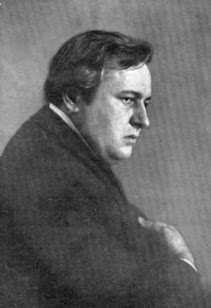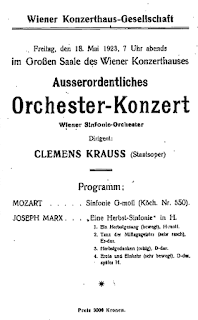Listening Recommendation: "Eine Herbstsymphonie" (1921) by Joseph Marx (1882 - 1964)
For many years Austrian composer Joseph Marx was, if at all, mainly known for his Lieder, which of course - numbering about 150 in total - form the lion's share of his musical output. Fortunately, in recent times he is deservedly being rediscovered as a composer of fine late-romantic orchestral, choral and chamber music, too. I would claim that all of Joseph Marx's music is indeed worth listening to, but without a shadow of a doubt, his "Herbstsymphonie" ("Autumn Symphony") - completed in 1921 - forms the pinnacle: a tour de force of orchestral power and prowess, putting its creator in line with the tradition of his fellow Austrian symphonists, Bruckner and Mahler. With more and more works being published on CD, Marx's followership will undoubtedly increase.
What is it, though, that makes his music so immediately appealing? I remember a discussion I had many years ago with my teacher, Prof. Bernd Glemser, about Mozart being the last composer of truly Apollonian music; I could not have agreed more. However, listening to my first Marxian scores - the "Romantic Piano Concerto" and the "Nature Trilogy" - I could not help but thinking that there exists yet another composer, more than a century after Mozart's death, whose music is, despite its scale and late-romantic sound, equally free of any Dionysian chaos and decadence. This remains the case even in its most complicated scoring or through its hugely amassed orchestral forces, up to the orgiastic, noisy bacchanal of the "Herbstsymphonie's" finale. It's all nothing but a lot of fun and playfulness!
Whilst finding much of its inspiration in the serene and stunning nature of the Austrian alps (especially of Marx's native Styria), the music steers clear of any Mahlerian solitude and despair or of Zemlinsky's dramatic, expressionist outbreaks, and whilst in many ways related to Strauss - think of the "Alpine Symphony", for example - as well as showing certain manifestations of impressionism (of Respighi and Ravel rather than Debussy) and Jugendstil, it is lacking much of the Germanic nature and emotional control of Liszt, Strauss or Bruckner (being akin maybe closest to Strauss's "Rosenkavalier"). If there was a likeminded predecessor, it should have been Johannes Brahms, with his 2nd Symphony, the violin concerto or the 2nd Piano Concerto, and mixed in perhaps a little of the spirit of Johann Strauß. Are there any contemporaries comparable to Marx? One could think of Korngold, was it not for the notion of Erol Flynn swashbuckling on the silver screen - and yes, the section between rehearsal numbers 164 - 167 in the symphony's finale sounds suspiciously like the climax in Scriabin's "Poem of Ecstasy".
 |
| Joseph Marx in 1923 |
Begun in 1916, the behemoth of a score (available on the Universal Edition's website) comprises the usual range and numbers of late-romantic instruments, aided not only by an omnipresence of percussion, but also by two harps, celesta and piano. Given a playing time of well over an hour, the symphony is divided into four traditional movements, each with its own descriptive title:
I. Ein Herbstgesang ("A Song to Autumn")
II. Tanz der Mittagsgeister ("Dance of the Midday Spirits")
III. Herbstgedanken ("Autumnal Reflections")
IV. Ein Herbstpoem ("An Autumn Poem").
As in Beethovens "Pastorale", however, the titles are not indicating any narrative or program, but are rather setting the scene for the varying characters of each of the movements.
Much later, in 1946, Marx re-designed the Finale as a separate symphonic piece, named Feste im Herbst ("Autumnal Revelries"), in order to secure itself an independent place within the concert repertoire, alongside some of his shorter orchestral pieces.
Following the tumultuous premiere of the "Herbstsymphonie" in 1922 under Felix Weingartner and the Vienna Philharmonic (there were saboteurs present at the beginning of the concert), the piece saw a number of further successful performances under the baton of Clemens Krauss in both Vienna and Marx's hometown Graz up to 1927. After that, the work fell into oblivion until 2005 when, in the very same town, a local orchestra and their conductor 'recreated' the symphony - after almost 80 years!* This event raised a growing interest not only in the "Herbstsymphonie" but in Marx's other orchestral works in general. Several recordings of many of the latter started to appear. Had it not been for the complexity of her score itself, we should have been able to hear more of the symphony performed by now.
 |
| Concert program of a performance by Krauss |
For details on the genesis of this magnificent piece, an analysis of its four movements and the tale of its re-discovery, have a look at this article on the website of the Joseph Marx Society, by one of their founders and Marx enthusiast Berkant Haydin, or read the story on his illuminating blog.
Fortunately, a live recording made by the American Symphony Orchestra under Leon Botstein had become available a few years ago, which is now joined by the work's first commercial recording on the CPO label, with the Grazer Philharmoniker under Johannes Wildner.
There is no need to go into detail about the formal structure, the harmonic language (you will hear a lot of augmented triads and German sixths, of course) or the orchestration. Let the music speak for itself when it paints a splendid picture of the glory of autumn in itself!
* Performed on 24th/25th October 2005, by "Recreation - Großes Orchester Graz" conducted by Michel Swierczewski, and made possible by the festival "Styriarte".


The Botstein recording with the ASO can also be found on
ReplyDeleteYouTube
A YouTube video featuring the full orchestral score is also available.
ReplyDelete